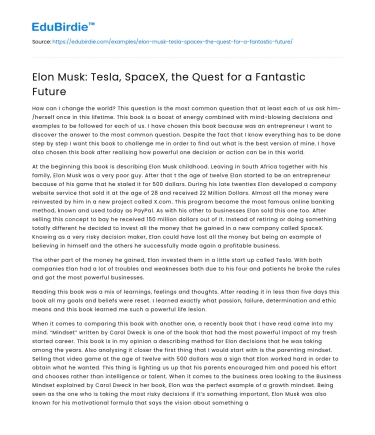Introduction
Elon Musk stands as one of the most influential figures in modern technology, renowned for his ventures in Tesla and SpaceX. His work not only embodies innovation but also encapsulates a vision for a sustainable and interplanetary future. Musk's endeavors have challenged traditional industries, pushing the boundaries of what is possible and inspiring a new generation of entrepreneurs. As the CEO and lead designer of SpaceX, as well as the CEO and product architect of Tesla, Musk has been instrumental in revolutionizing electric vehicles and space exploration. His relentless pursuit of ambitious goals has garnered both acclaim and criticism, sparking debates about the feasibility and ethics of his projects. This essay will explore Musk’s contributions to Tesla and SpaceX, assess his impact on technological advancements, and address the criticisms surrounding his visionary pursuits.
Transitioning from the introduction to an exploration of Musk's ventures, it is essential to recognize the overarching themes of innovation and disruption that define his career. Musk’s initiatives have not only transformed industries but also ignited discussions on sustainability and the future of humanity. The following sections will delve into the specifics of his achievements and the broader implications of his work.
Save your time!
We can take care of your essay
- Proper editing and formatting
- Free revision, title page, and bibliography
- Flexible prices and money-back guarantee
Tesla: Transforming the Automotive Industry
Elon Musk’s impact is perhaps most visible through Tesla, a company that has redefined the automotive industry with its pioneering electric vehicles (EVs). Established in 2003, Tesla has rapidly evolved under Musk’s leadership, becoming synonymous with innovation in sustainable transportation. The introduction of the Tesla Roadster in 2008 marked a significant milestone by proving that electric cars could be both high-performance and desirable. Subsequently, models such as the Model S, Model 3, and Model X have continued to set benchmarks for range, safety, and autonomous driving capabilities.
Tesla's commitment to sustainability extends beyond vehicles to include solar energy solutions and battery technology. The acquisition of SolarCity in 2016 was a strategic move to integrate sustainable energy generation and storage, thereby promoting a holistic approach to environmental responsibility. According to a report by the International Energy Agency (IEA), Tesla's advancements have significantly contributed to a global shift towards renewable energy sources, positioning the company as a leader in the clean energy revolution (IEA, 2021).
However, Musk's ambitious targets and aggressive timelines often attract skepticism. Critics argue that the company’s focus on rapid expansion and innovation occasionally leads to quality control issues and unmet delivery schedules. Nonetheless, Musk’s ability to galvanize public interest and investment in sustainable technologies remains unchallenged, underscoring his role as a catalyst for change in the automotive sector.
Transitioning from Tesla to his ventures in space exploration, Musk's endeavors continue to reflect his overarching ambition to push the boundaries of human potential. His leadership at SpaceX exemplifies a similar drive to revolutionize an industry and pave the way for a future beyond Earth.
SpaceX: The Final Frontier
SpaceX, founded by Elon Musk in 2002, epitomizes his vision for making space travel accessible and affordable. The company's mission to enable human life on Mars is a testament to Musk’s long-term vision of an interplanetary future. SpaceX has achieved numerous milestones, including the successful launch and landing of the Falcon 9 rocket, which marked a significant step towards reducing the cost of space exploration through reusable technology.
The development of the Starship spacecraft further illustrates Musk's ambition to facilitate human colonization of Mars. Designed to carry large numbers of passengers and cargo, Starship represents a critical component of Musk’s goal to establish a sustainable human presence on the Red Planet. As Musk stated in an interview, "If we're going to have a future that is exciting and inspiring, it has to be one where we're a spacefaring civilization" (Musk, 2017).
Despite these achievements, SpaceX faces substantial challenges, including regulatory hurdles, technical setbacks, and the immense financial costs associated with space exploration. Critics contend that Musk’s focus on Mars colonization diverts attention and resources from pressing earthly concerns, such as climate change and social inequality. Nevertheless, SpaceX’s accomplishments have undeniably advanced the field of aerospace engineering, inspiring renewed interest in space exploration and demonstrating the potential of private enterprise to achieve what was once the domain of government agencies.
Transitioning to the conclusion, Musk's efforts in both Tesla and SpaceX highlight a broader narrative of technological disruption and visionary leadership. His work continues to challenge conventional thinking, sparking both admiration and controversy.
Conclusion
In conclusion, Elon Musk emerges as a pivotal figure in the realms of automotive innovation and space exploration. Through Tesla, he has propelled the electric vehicle industry forward, championing sustainability and renewable energy. Meanwhile, SpaceX embodies his grand vision of an interplanetary future, pushing the boundaries of what is possible in aerospace technology. While his initiatives are not without criticism, particularly concerning feasibility and prioritization of resources, Musk's influence on technology and entrepreneurship is indisputable.
Ultimately, Musk’s ventures underscore a profound commitment to innovation and a determination to address some of humanity’s most pressing challenges. Whether revolutionizing transportation or exploring the cosmos, his work inspires a future filled with possibilities and hope. As society continues to grapple with the complexities of technological advancement, Musk's legacy will likely serve as both a catalyst for progress and a reminder of the power of visionary thinking.






 Stuck on your essay?
Stuck on your essay?

